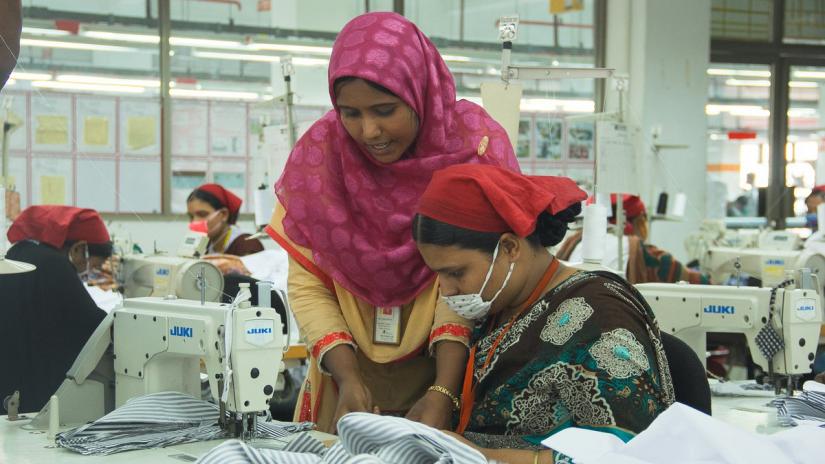 The Supreme Court has extended till May 19 the tenure of Accord, the factory inspection mechanism set up by European fashion labels.
The Supreme Court has extended till May 19 the tenure of Accord, the factory inspection mechanism set up by European fashion labels.
The extension came after the top court on Monday (Apr 4) adjourned hearing of an appeal filed by Accord challenging a High Court judgment that asked the agency to stop activities until May 19.
A four-member bench of the Appellate Division headed by Chief Justice Syed Mahmud Hossain passed after the European agency moved a time plea.
The court passed the order after it was informed of a meeting between Accord and Bangladesh Garment Manufacturers and Exporters Association (BGMEA).
The court also ordered Accord to come at a negotiation with the government on the matter.
Previously, after the five-year-term of Accord expired on Nov 30, the matter of its extension went to the High Court which ordered a halt.
Matters were then taken on to the Supreme Court; which deferred the hearing multiple times previously.
The Accord conducts inspection and remediation activities for more than 200 global clothing retailers and brands.
International campaigners, however, say the safety of workers could be at risk if Accord is shutdown.
The government has shown “a shocking level of unreadiness” to take over from Accord - signed by about 200 major brands and unions after the 2013 Rana Plaza disaster - said four groups, including Clean Clothes Campaign last month, Reuters reported.
“At this moment, the Accord is the only organization that is meaningfully and transparently making factories safer,” it quoted Christie Miedema, a spokeswoman for the alliance of garment industry unions and advocacy organizations, saying.
“A forced early transition could jeopardize the finalization of the vital elements of remediation,” she said, referring to Accord’s efforts to make some 1,700 factories safe before it is scheduled to hand over to government inspectors in 2021.
Bangladesh, the world’s second largest garment producer, however, says it’s capable of monitoring the thousands of factories through its Remediation Coordination Cell (RCC), which is currently responsible for the safety of 745 factories.
Worker safety has come under scrutiny in Bangladesh after the Rana Plaza factory collapsed, killing about 1,100 people, and putting big brands under pressure to ensure their products are responsibly sourced.
 Business
Business
30914 hour(s) 41 minute(s) ago ;
Evening 09:35 ; Friday ; Apr 26, 2024
Accord’s tenure extended till May 19
Send
Bangla Tribune Report
Published : 16:33, Apr 15, 2019 | Updated : 16:40, Apr 15, 2019
Published : 16:33, Apr 15, 2019 | Updated : 16:40, Apr 15, 2019
0 ...0 ...
/bi/hb/zmi
Topics: Top Stories
- KOICA donates medical supplies to BSMMU
- 5 more flights to take back British nationals to London
- Covid19: Rajarbagh, Mohammadpur worst affected
- Momen joins UN solidarity song over COVID-19 combat
- Covid-19: OIC to hold special meeting
- WFP begins food distribution in Cox’s Bazar
- WFP begins food distribution in Cox’s Bazar
- 290 return home to Australia
- Third charter flight for US citizens to return home
- Dhaka proposes to postpone D8 Summit
Unauthorized use of news, image, information, etc published by Bangla Tribune is punishable by copyright law. Appropriate legal steps will be taken by the management against any person or body that infringes those laws.
Bangla Tribune is one of the most revered online newspapers in Bangladesh, due to its reputation of neutral coverage and incisive analysis.
F R Tower, 8/C Panthapath, Shukrabad, Dhaka-1207 | Phone: 58151324; 58151326, Fax: 58151329 | Mob: 01730794527, 01730794528






